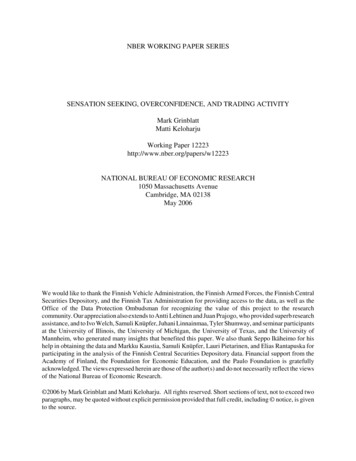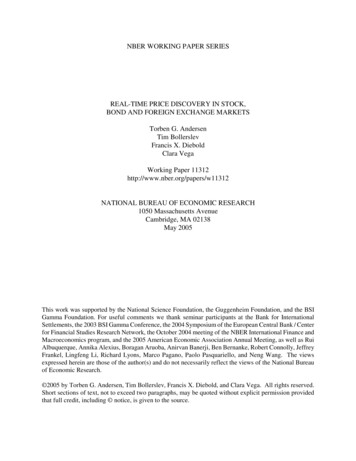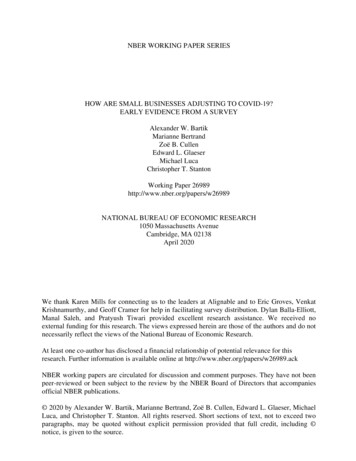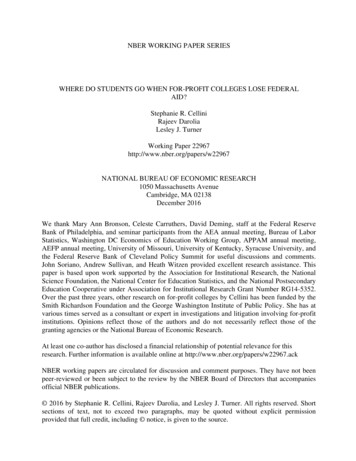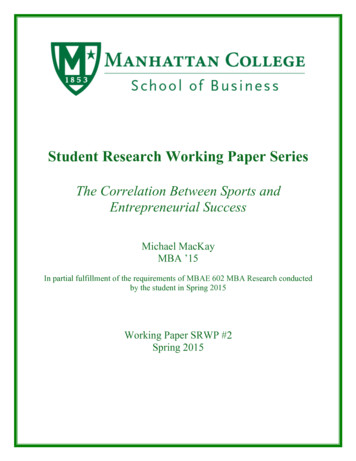
Transcription
Student Research Working Paper SeriesThe Correlation Between Sports andEntrepreneurial SuccessMichael MacKayMBA ’15In partial fulfillment of the requirements of MBAE 602 MBA Research conductedby the student in Spring 2015Working Paper SRWP #2Spring 2015
Marketing
S8OVERALL- ‐FIGURES1.2AND1.3BUSINESSOWNERS- ‐FIGURES1.4AND1.5STARTUPMEMBERS- 1
AbstractThe business environment is changing all over the world, and especially inthe United States. Startups and entrepreneurs are completely revolutionizing theeconomy and the conventional traditions of business. With this explosion, manypeople have tried to dissect the characteristics and skills of entrepreneurs todevelop a sense for what makes a specific individual successful inentrepreneurs. Starting a new business and innovating demands dedication,determination, and hard work, just like athletics do. Is there a correlationbetween sports and business? This study aims to take an in-depth look to see ifan athlete is better suited to achieve success in entrepreneurialism over thosethat have not competed in organized sports.IntroductionWith the rise of entrepreneurialism in the United States, study upon studyhas tried to address the question of what makes a successful entrepreneur? Arethe most successful entrepreneurs born with a specific gene set, skills,intelligence, or knowledge that helps them reach the top of the business world, orcan these traits be taught and developed over an entire lifetime? What factorscould potentially affect this development? Even though many studies provide a
strong argument as to what makes someone more successful in business, onlyone thing has become clear - there is no specific criterion for what makes anindividual successful in business. Each business is different, and eachbusinessperson is unique.This study will aim to take an in depth look into a specific factor that couldpotentially lead an entrepreneur to success: sports. Sports are worldwide culturalphenomenon that’s accepted and followed by a majority of people in welldeveloped countries. However, could participation in organized sports be a factorfor entrepreneurial success? Ask any athlete about what they’ve learned fromcompeting in sports and how it’s shaped their character, and its sure they willhave something to say. So how could this shape their future success if they enterinto business? Success in sports takes commitment, dedication, and discipline,just like running a business demands.That’s what this study looks to address. Through months of studyingathletes, business owners, and members of startup teams, this study will analyzethe correlation between sports and success in an entrepreneurial venture. Overthe course of several months through the use on outlets such as LinkedIn andother online forums where entrepreneurs gather, this study has been introducedto an estimated 800,000 business-minded people. Those who used to competein sports and currently own a business or work at a startup were encouraged toshare their input and experience through a comprehensive survey. This survey
asks on what level they competed on, which sport they competed on, and theirsuccess levels in their entrepreneurial ventures. Before this data was collected,however, I hypothesized these two predictions:Hypothesis1: Those that competed in sports in college are moresuccessful in entrepreneurialism than those who did not participate insports.Hypothesis2: Those that competed in individual sports in college will havehigher success levels in entrepreneurialism than those who competed inteam sports.These hypotheses are based on research into the fields of sports, business, andentrepreneurialism, as well as through personal experience. Business Insiderreported a study that claims females in leadership or management roles in allareas of business are more likely to have participated in sports before. Out of the400 CEOs, CFOs, CMOs, and other managers surveyed, almost 75% of thembelieved sports enabled them to reach the positions they were in (EY, 2014).Only 3% of these women in management roles never played any competitivesports.A major reason why people believe sports helps an individual climb thecorporate ladder is because rising the ranks of a business takes similar hardworkand dedication as sports require. being competitive is necessary to stand out
from other peers and business acquaintances. A recent study completed by FastCompany indicates that student athletes make for good entry-level hires, as theirlack of business experience is compensated through their physical pursuits(Vozza, 2014). A quick Google search of “hiring athletes” yields over 9 millionresults, full or articles praising athletes in the workplace.It may seem like there’s no need to complete another research studyexamining the effect of participation in sports on the professional development ofan individual, but this study is not looking to find how sports benefits theworkplace. Most studies take a look at athletes in the corporate world.Entrepreneurship is a completely different world that is full of individuals that maynot excel in a corporate structure. Starting a completely new business to solve aproblem takes a different kind of thinking and different skill sets.Many people have looked into what traits successful entrepreneurs aremade of. These traits include having passion, the ability to persevere in toughsituations, and being resourceful (Resnick, 2014). This study aims to analyzewhether or not competitive sports develop these critical characteristics.When most people think of entrepreneurs, Bill Gates, Steve Jobs, andMark Zuckerberg are commonly the first people that come to mind. However,these people are infamous for having different personalities. While its beenclosely studied that these strange personalities likely have led to their outlyingsuccess, this study will not focus on traits of these entrepreneurs. Our target
market for this study is today’s “common entrepreneur.” Time Magazine reportsthat typical high-growth business are now being started by those between theages of 20-34 who are earning modest, yet profitable income for their startups.MethodThe study, which spanned several months, interviewed differententrepreneurs from different industries all across the United States. The studycomprised of an extensive survey that asked business owners and startupmembers whether or not they consider themselves successful in their ventures,and how sports contributed (or did not) contribute to their success. Becauseeveryone has a different view of success, the study allowed entrepreneurs todefine their own definition of success. The study was posted on the followingforums and online groups comprised of entrepreneurs and small businessowners: Leadership Think Tank The Indus Entrepreneur Global Entrepreneur Network Small Business Network: Startups & Entrepreneurs talk Social MediaMarketing Startup Jobs Sales PR Angel Investor Group Young Entrepreneur Connections
Bright Ideas & Entrepreneurs Startup Community Band of EntrepreneursThe total reach of this study is around 800,00 people interested inentrepreneurship, startups, and small businesses. Although not all of thesepeople are entrepreneurs or startup members themselves, 327 peopleresponded. After narrowing the results down to include only those working at astartup or running one, 292 remained.The questions in the survey were interactive with previous answers. Forexample, if an entrepreneur answered “Yes” to the questions, “Did youparticipate in competitive sports in college?” they would be directed to answerwhich sports they participated in. Those who did compete were also asked torate how much of an impact their participation in sports have on their professionallives. For those who did not participate in sports in high school or college, theywould simply be asked to rank their success in business.ResultsTo fully understand the results of this study, the data was split up intothree different segments. After eliminating all of the survey responses frompeople who do not own a business or work at a startup, the data was brokendown to analyze the overall survey population, those that own businesses, and
then those that work at a startup. Figure 1.1 below shows the breakdown of theraw data collected.It may be hard to draw conclusions from just the numbers listed in Figure 1.1, solet’s breakdown the data into visual charts to help create a better picture of thepotential correlation.Overall- ‐Figures1.2and1.3
Figure 1.2 shows that the large majority of the survey participants competed incollege athletics. However, the success rate of athletes versus non-athletes isexactly the same, both averaging 6.5 out of a 10-point scale as shown in Figure1. 3.BusinessOwners- ‐Figures1.4and1.5
It turns out that those that actually started a business and own it themselves,rather than working with a team in a startup, are more likely to have participatedin sports. Out of the 182 respondents that own businesses, 146 of themcompeted in sports. However, it seems that the non-athletes who run their ownbusinesses have slightly higher success versus the athletes.StartupMembers- ‐Figures1.6and1.7
The data collected could help indicate a correlation between participationin sports and achieving success in a startup environment. A startup environmentcan be qualified as a new business venture comprised of only a few people. Notall businesses are started as solo projects. In fact, many investors and businessexperts believe partnerships and startup teams are they best way to create asuccessful business. Out of the 110 respondents that work in a startup, 74indicated that they previously, or continue to, compete in organized sports.The success levels of athletes versus non-athletes in startups differ themost in this study. The 74 athletes that work for a startup averaged a successlevel of 7.5 on a 10-point scale, while those that did not play sports averaged asuccess level of 4.Individualvs.TeamSports
he second hypothesis of the study sought to look at whether or not thereis a difference in athletic entrepreneurs considering the sports they competed inwere an individual sport or a team sport. Out of the twenty-two NCAA sanctionedsports, exactly eleven can be defined as individual sport and the other eleven areteam sports. This 50-50 split actually appeared in the data, as about 50% of the219 athletic participants competed in team sports, and the other half competed inindividual sports. Of these 219 people, both groups of people averaged successlevels of 6.5, meaning there is no difference.DiscussionAfter collecting and analyzing the data in this comprehensive survey,some interesting points arose. Hypothesis 1 states that those who competed insports in college will be more successful in entrepreneurial ventures. However,
the data does not directly support this hypothesis. Overall, the success rate ofathletes averaged the same as those who do not play sports. Entrepreneurs whostarted ventures individually actually averaged lower success if they competed insports in college. While this difference is minimal, athletes that are apart ofstartup teams are much more successful than startup members who opted to notcompete in physical sports. Let’s further break down each category analyzed.OverallThe overall purpose of this study was to take a look into what makes asuccessful business owner, entrepreneur, or startup member and see whether ornot participation in sports has any type of effect on the success of the individual’scareer. While looking at the overall results of the survey, it seems that there is nogeneral effect sports has on the business world. The athletes in the study hadthe exact same success levels as those who are not athletes. This is quiteinteresting considering that success in business requires very similar skills,dedication, and work ethic. It would seem clear that athletes are more successfulin business considering they’ve proven that they once had what it takes to pushthemselves to success.What’s most interesting about this study is that a majority of therespondents of the survey did compete in sports in college. The governing bodyof college athletics, the NCAA, conducted a study found that there about eight
million athletes in high school at any given time. Out of these eight million, only460,000 will get the chance to play on a higher level in college (NCAA, 2013).That means only 5.7% of athletes have what it takes to reach the college level,whether that’s Division I, II, or III, or a smaller junior college. With that beingsaid, a similar percentage should have appeared in the data. However, anoverwhelming majority of the respondents in our study competed in athletics incollege. Out of 292 people surveyed, 75% percent of them competed in college.There may be some interesting facts behind this statistic.Whereas our study aimed to look at how sports effects success inentrepreneurs, perhaps another study could be conducted to see if sports has animpact on choosing to become an entrepreneur or business owner. Generallyspeaking, sports may not have an impact on the success of an individual’scareer, but there may be a correlation between participation in sports andchoosing to be an entrepreneur. Do competitive sports push athletes to choose acareer working for themselves or on a small team, rather than a corporate careerfor a large, well-established firm in business?This study did not find why so many athletes participated in the study, butit could be because starting a business is similar to competing in a sport. Thereis always uncertainty, its takes extreme resourcefulness, and encouragesworking on small teams. Starting a new venture may seem familiar with them,
and they may be more comfortable endeavoring this scary career path than nonathletes do.The title of the survey was labeled as “The Correlation Between Sportsand Entrepreneurial Success,” which may have appealed to athletes more. Thismay have pushed athlete entrepreneurs to take they survey because they couldrelate to it, and non-athletes would not be so attracted to it. Even if this is true,however, 75% is an extremely large majority considering less than 6% of thepopulation could make it to compete under the NCAA.Although the data did not show any correlation between participation insports and success in entrepreneurialism speaking generally, the data did showinteresting statistics when further breaking down the respondents.BusinessOwnersWhere 75% of the general survey population competed in athletics, evenmore who can be labeled as business owners were athletes at one time. Out ofthe 182 business owners, 81% were once athletes. However, this data indicatesthat participation in sports has a negative effect on the success on businessowners. This does not mean that the athletes who started business are likely tonot be successful at all, but their levels of success were reported to be lowerthan those who did not compete in college. The data collected for businessowners actually counters Hypothesis 1.
Athletes may be better suited to perform well alongside peers andteammates. They are able to trust one other people to carry out tasks to helpthem reach a goal, rather than doing it alone. While the study also took a lookinto the different success levels of those who compete in individual sports andthose who did so on teams, individual sports are still teams. For example,swimming is considered an individual sports. However, in order to win a swimmeet against another school, it takes the efforts of all the athletes on a teamcombined to win. So while the primary action of the sport is done alone, theathletes are still working towards a common goal alongside teammates that theyneed to rely on and trust.A report from 2010 found that athletes in college could spend up to 40hours a week on activities specific to their sport. The typical college athletespends 32.1 hours a week practicing, preparing, and recovering from sports(Jacobs, 2015). That makes 32.1 hour that they’re spending with fellowteammates, all depending on one another to play their part. They are constantlysurrounded by a team atmosphere, which may prime them to thrive in a teamsetting rather than alone. This could be a reason why their success levels werereported to be lower than those who are not athletes.
StartupMembersThe results from the breakdown of the survey for those that are membersof a startup community support the theories listed above. The population ofstartup members in the survey had the lowest participation in sports, though still67% reported competing in college. However, the success levels varied the mostin terms of athletes versus non-athletes. The difference in the average successlevels of business owners is relatively minimal, with only a .5 difference. Athleteson a startup, however, averaged 3.5 points higher than non-athletes in a startupenvironment. This is a noteworthy difference, and it may be because of thereasons listed above for the discussion of the Business Owners results.After taking a look at these results, it would be interesting to study theindependence of athletes. They may actually not be very independent, whichcould be why it was reported that they do not thrive as well in soloentrepreneurial ventures, but do in a startup environment. The data from theStartup Members section actually supports Hypothesis 1 by illustrating that thereis a correlation between sports and success in startups.In the United States today, 90% of startups fail, likely before they evenlaunch (Patel, 2015). However, the athletes that work for startups reported anaverage success level of 7 on a 10-point scale. A large majority of startups fail,but a majority of the athletes who responded to the survey are successful. Doathletes possess something that other people don’t that enables them to drive a
startup to success? This certainly supports the hypothesis that sports have apositive correlation on the success of an entrepreneur.Individualvs.TeamSportsThe second hypothesis predicted that the study would find that those whoparticipated in individual sports such as track and field, swimming, golf, etc.would have higher success levels than those who play on team sports likefootball, soccer, basketball, and baseball. The latter are more popular sports inthe United States, which could potentially skew the results. Although the datashows that there is no difference at all, its interesting to see that a large portionof the athletes that responded competed in individual sports considering thecultural popularity of team sports in the Untied States. The NCAA sponsorsexactly 11 individual sports and 11 team sports, but a majority of the athletes isapart of team sports. While the NCAA does not keep detailed records regardingthe amount of athletes in a particular sport, the largest participation is in footballwhere the average size of a college football team is 110 players (NCAA, 2013).As stated earlier, there may be a correlation between participation insports and choosing to become an entrepreneur, rather than a correlationbetween success as an entrepreneur and athletics. After looking into Hypothesis2, there’s a possibility that individual sports push athletes to becomeentrepreneurs more than team sports do.
ConclusionIt is extremely tough to look into what makes a successful entrepreneur.With infinite possibilities, it’s almost impossible to develop a clear blueprin
In partial fulfillment of the requirements of MBAE 602 MBA Research conducted by the student in Spring 2015 Working Paper SRWP #2 . EntrepreneurialSuccess!!!! Michael!Mackay mmackay.student@manhattan.edu Manhattan!College!School!of!Business Faculty!Advisor:! Professor!AlicjaReuben alicja.reuben@
